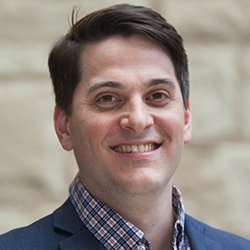Jeffrey Richards Receives Prestigious NSF CAREER Award
Award recognizes outstanding research and education from junior faculty
Northwestern Engineering’s Jeffrey Richards received the Faculty Early Career Development (CAREER) Award from the National Science Foundation (NSF), the foundation’s most prestigious honor for junior faculty members.
The CAREER Award is designed to support promising young faculty members who exemplify the role of teacher-scholar through the combination of outstanding research and education.
 Richards is an assistant professor of chemical and biological engineering in the McCormick School of Engineering. His project “Design Rules for Electrical Transport in Suspensions of Conductive Particles” will receive $518,109 over five years from NSF’s Division of Chemical, Bioengineering, Environmental and Transport Systems. The work will focus on combining new synthesis techniques with advanced structural and electrical characterization methods to bridge the current gap in understanding electron transport in fluid suspensions of conducting particles.
Richards is an assistant professor of chemical and biological engineering in the McCormick School of Engineering. His project “Design Rules for Electrical Transport in Suspensions of Conductive Particles” will receive $518,109 over five years from NSF’s Division of Chemical, Bioengineering, Environmental and Transport Systems. The work will focus on combining new synthesis techniques with advanced structural and electrical characterization methods to bridge the current gap in understanding electron transport in fluid suspensions of conducting particles.
This project will also prepare the future workforce with foundational knowledge in the properties of soft materials and their potential application to emerging and contemporary societal challenges.
Motivated by recent rheo-electric measurements of suspensions of carbon black in polar and non-polar solvents, this project will test the hypothesis that particle dynamics play a significant and underappreciated role in mediating electron transport in fluid suspensions of conducting particles. The objective will be to test this hypothesis with three novel approaches. New synthetic approaches will control the size, shape, and interactions between conductive nano- and micro-particles, while new rheo-electric characterization techniques will allow for direct quantification of electrical transport characteristics.
Richards’s laboratory seeks to quantify the relationships linking the microscopic structure of multicomponent materials to their macroscopic properties. The group is interested in exploiting these relationships to develop new materials that facilitate the generation, storage, and transport of electrical charge. These materials form the basis of emerging technologies that address challenges associated with the transition to a renewable-energy driven infrastructure.